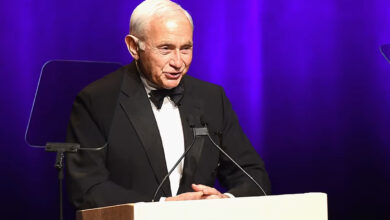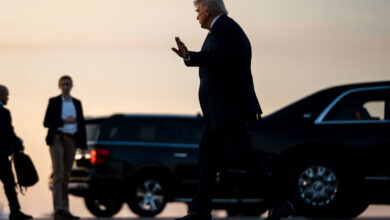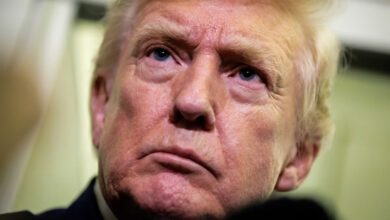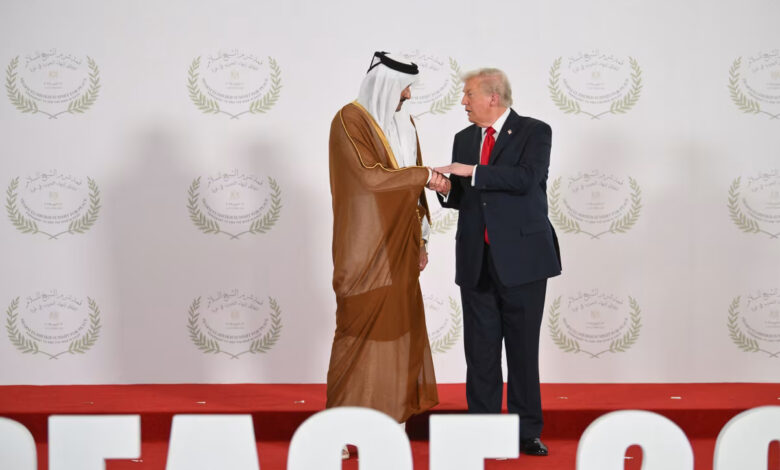
As he flew to the Middle East to celebrate his diplomatic victory on a ceasefire and hostage release in Gaza, President Donald Trump heaped praise on one ally in particular: Qatar.
“Qatar was a tremendous help to getting this done. I hope people can realize that,” Trump told reporters on Air Force One. “It was very tough and very dangerous for Qatar. They were very brave.”
The Gulf nation has long been a broker in diplomatic negotiations but its key role as mediator, along with Egypt, in the Gaza talks further cemented its stature in the eyes of the US president.
In a sign of the warm relationship within his first 10 months in office, Trump received a plane meant to be used as Air Force One from Doha and the president signed an executive order giving Qatar an unprecedented bilateral defense pact with the US following an Israeli strike on Hamas leaders in its capital Doha.
But Trump’s effusive praise was a far cry from his stance on Qatar in the early months of his first term, when he accused the nation of funding terrorism in the region.
US officials, regional sources, and experts say the vastly improved relations are due to the development of personal relations between Trump and members of his close inner circle and Qatari leaders, a steady campaign of lobbying, and the nation’s ability to deliver as an effective interlocutor between the US and a vast number of players including the Taliban, the Houthis, Iran and Hamas.
“I can’t recall any country that’s had the turnaround that Qatar has,” said Ben Freeman, who tracks foreign influence at the Quincy Institute for Responsible Statecraft.
‘The Qataris were critical’
Trump signaled the importance of his relationship with Qatar to his second term by including the small nation on the first overseas trip after his inauguration.
Trump immediately tapped into the relationships that had developed during his first term and had been strengthened by business deals that his friends and family had done with Qatar in recent years, explained current US officials and regional diplomats.
The Trump family’s business ties to the Middle East have more than tripled since the president’s first term in office, a CNN tally of the deals found in May. Earlier this year, the Trump Organization announced plans for a Trump-branded golf resort in Qatar that was supported by a firm backed by Qatar’s sovereign wealth fund.
The Qatari Emir also maintained direct contact with Trump during his years out of office, which is something not all other world leaders did, a source familiar with the matter said.
The familiarity made for productive, trustworthy and blunt interactions, sources said.
Freeman noted that Trump “wants to be seen as this great dealmaker” and win the Nobel Peace Prize, and Qatar is seen as being able to “help him get done on the international stage what he wants to get done.”
Qatar helped to draft the 21-point plan for peace in Gaza that Witkoff initially shared with Arab and Muslin nations in New York, which led to pivotal discussions that laid the groundwork for the hostage release and ceasefire which came just weeks later, a source said.
And then, when last week’s high-stakes negotiations occurred in Egypt, Trump’s top envoy Steve Witkoff and his son-in-law Jared Kushner met privately with Hamas leader Khalil al-Hayya and a senior Qatari official, a meeting which led to a breakthrough in negotiations, according to two sources familiar with the matter. It came as Hamas was looking for reassurances that Israelis would not reignite the war after the Israeli hostages held by the group were released.
The Qataris sought out Witkoff and Kushner for the meeting, first reported by Axios, which was pivotal in securing the agreement to release hostages and put a ceasefire into effect later that night.
“Plain and simple, that agreement would not have been accomplished without the Qataris,” said an administration official. “The Qataris were critical in facilitating discussions with Hamas that were crucial in securing a final agreement in Egypt.”
Trump spoke highly of the Qatari Emir Tamim bin Hamad Al Thani when they signed an agreement aimed at regional peace alongside other regional leaders.
“His Highness Sheikh Tamim is respected by everybody. He’s respected by everybody, and in the most positive way. Not only because of power, because of his heart. He’s got a tremendous heart and he’s a great leader, and his country loves him,” Trump said.
Still, Qatar remains a controversial topic within Trump’s orbit, with some key allies of the president voicing deep concerns about the country’s growing influence.
Among the loudest critics of Qatar is far-right activist Laura Loomer, an influential figure within the administration who slammed the announcement Qatar would be allowed to build an Air Force training facility in Idaho last week.
Trump’s Republican allies in Congress have also been left in the dark, at times, about Qatar’s dealings with the administration, even on matters that directly impact the states they represent.
Idaho’s entire GOP-led congressional delegation, which includes chairman of the Senate Foreign Relations Committee Sen. Jim Risch, and its Republican Governor, only learned that the administration had formally agreed the Air Force training deal when it was announced publicly by Defense Secretary Pete Hegseth, according to a source familiar with the matter.
Qatar’s relationship with the Trump administration was also tested earlier this year when the US did not notify them before Israel carried out a military strike against Hamas leaders in Doha. US officials scrambled to contain the potential fallout from the strike by reassuring Qatar it, too, was left in the dark by the Israelis, despite evidence top administration officials were told before bombs were dropped.

Ultimately, Trump pushed Israeli Prime Minister Benjamin Netanyahu to apologize to Qatar — which he did via phone from the Oval Office during a recent trip to the White House. Sources familiar with the incident told CNN that the administration’s failure to notify Qatar ahead of time, given its central role in negotiations, initially raised serious questions about US credibility at the time. But when Trump forced Netanyahu’s apology, the “answer came back very firmly” that the US was serious about maintaining the US-Qatar alliance, according to a regional source said.
“You saw the picture, Netanyahu reading from a paper. The picture talks more than the pen,” the regional source said, noting the executive order bolstering the alliance between the US and Qatar.
Qatar delivering on Taliban talks crucial to first term shift
The relationship between Trump and Qatar started on tense footing during his first term.
“Qatar’s influence in the US in 2016 was nominal at best,” Freeman told CNN.
In June 2017, at the beginning of a diplomatic crisis sparked by Saudi Arabia, the United Arab Emirates, Egypt and Bahrain cutting diplomatic ties and imposing a blockade on Qatar, Trump lambasted Doha.
“We had a decision to make,” Trump said, describing conversations with Saudi Arabia and other Gulf countries. “Do we take the easy road or do we finally take a hard but necessary action? We have to stop the funding of terrorism.”
The aggressive remarks perplexed even his then Secretary of State Rex Tillerson who asked aides following the speech how the comments had ended up in the president’s speech, according to a source familiar with the interaction.
Tillerson and top military officials then made it a priority in the following months to brief Trump on the strong US-Qatar relationship on both military and diplomatic fronts, particularly providing details about Qatar being home to Al-Udied which is the largest US military base in the region.
Tillerson, a former Exxon executive, also had particularly close relations with Qataris after having done energy deals with the Gulf nation.
Around the same time, according to Freedman, Doha “sought to flip the script really quick and went on a lobbying and PR firm hiring blitz.”
“They started hiring Republican heavyweights from (former Attorney General) John Ashcroft’s firm, several other firms, Ballard, that were very close to the President,” Freeman explained. Attorney General Pam Bondi was a registered lobbyist for Qatar during Trump’s first term.
But over time the blockade made Trump more receptive to Qatar, a former administration official said. The Gulf nations claimed the blockade was an effort to apply economic pressure on Qatar as a result of its alleged support for terrorism, but as it continued Trump worried it was stifling progress and economic ties in the region, the official said.
Trump was also irritated at the other regional players for putting the blockade into place without giving the US advance notice – a move they took just weeks after Trump had visited Saudi Arabia, which was the first overseas trip of his administration.
“Trump gives people under attack the benefit if the doubt, he also felt blindsided by the move which he did not like,” said a former Trump administration official.
Less than a year after his inflammatory White House remarks, in April 2018, Trump hosted the Qatari Emir at the White House.
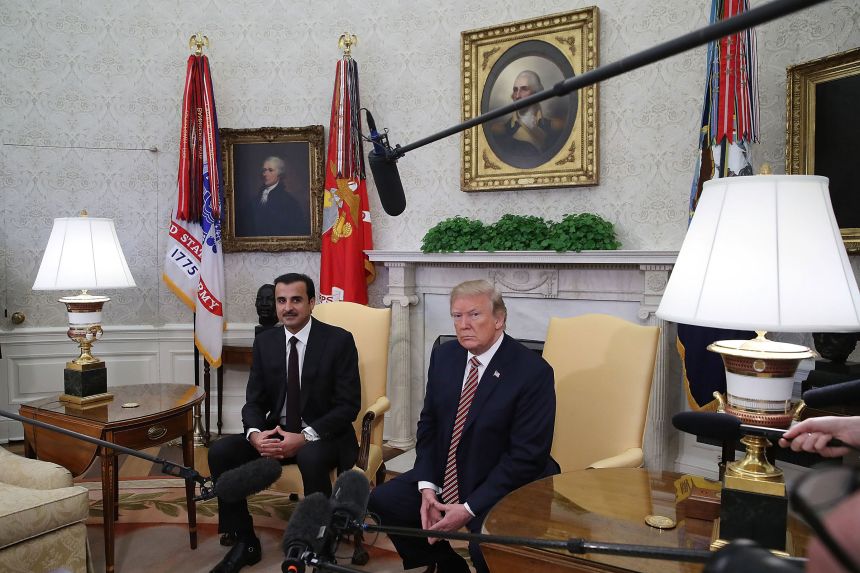
When the Emir visited Washington for a second time in 2019, administration officials noticed that the two developed a good personal rapport, multiple sources said. Trump went to a Treasury Department dinner with the Emir which he had not been scheduled to attend – reflecting a real warming in relations, sources said. At that time, Doha was hosting talks between the US and the Taliban as Trump pushed for an end to the war in Afghanistan.
“Things were fine, but they had not gone from opponents to friends,” said John Bolton, Trumps’ national security adviser at the time.
That changed, Bolton recalled, after the signing of the Doha agreement between the Taliban and the Afghan government which set into motion the withdrawal of US troops from Afghanistan. Trump’s top Taliban negotiator, Zalmay Khalilizad, spent copious amounts of time with the Taliban in Doha, meetings that paved the way for the agreement to be signed.
“That’s really the point where they moved, started moving towards the relationship they have now,” Bolton said. “The American president had asked them to do something and they were doing it.”
Trump himself has chalked up the difference to having not really known the country in 2017 when he first became president.
“I didn’t really know them very well,” Trump told reports of his initial take on the small but rich nation in 2017. “As I got to know them, I got to understand them, and I got to realize that they’re in the middle of they are right in the middle of everything. Other countries are there, but they’re an hour and an hour-and-a-half away. A big difference.”
Qatar has come through for Trump where others failed
In Trump’s second term there have been multiple instances where the administration has gone back to Qatar when other intermediaries have not delivered.
During Gaza talks earlier this year, the administration at one point tried a new tact putting a Palestinian-American who was not a government official in charge of the talks with Hamas to try and drive a Gaza ceasefire. But when that approach failed to produce results, they shifted back to Qatar as the critical interlocutor with the group.
A similar situation unfolded when it came to efforts to draw Iran into a new nuclear deal. The Trump administration initially relied on Oman to facilitate months of indirect talks with Iran led by Witkoff, but when those talks fell apart the administration turned back to Qatar to engage in dialogue with Iran. Ultimately the deal never manifested, and Trump carried out strikes on Iran’s nuclear sites. But the importance of Qatar as a trusted go-between had been cemented once again.
Now, advancing the Gaza agreement to the next phase which would include de-militarizing Hamas is set to further test Qatar’s ability to serve as a back-channel with Hamas. White House Spokesperson Anna Kelly said that the Qataris are “invested in ensuring that the deal is implemented.”
But the breadth of efforts that the US and Qatar are working on are also widespread. Dr. Majed Al Ansari, the spokesperson for Qatar’s Ministry of Foreign Affairs, cited the wide range of issues the country is working on with Trump.
“We are working right now with the administration on DRC-Rwanda, working with them on Venezuela, working with them on Colombia, working with them on the myriad of issues, some of them I can’t mention right now, all related to peace facilitation,” he said at the Concordia Summit event on the sidelines of the UN General Assembly in late September.
“That appreciation of the relationship in Qatar does not go unnoticed,” Al Ansari continued.
“This goes beyond any individual, but working with President Trump, working with this administration very closely, is something that has brought a lot of results,” he said. “It’s a relationship that is beneficial for the region as a whole and for the world.”
CNN’s Zachary Cohen contributed reporting.


